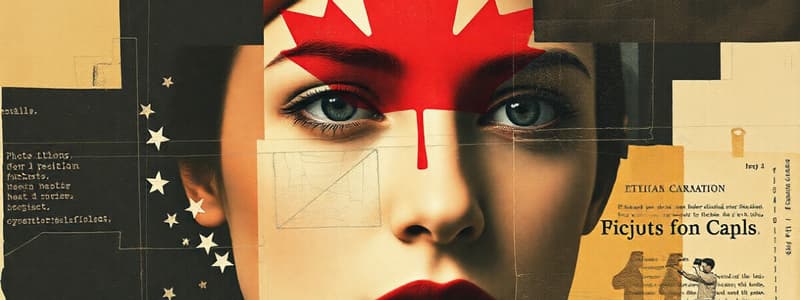Podcast
Questions and Answers
What is a common offence under the Liquor Licence Control Act?
What is a common offence under the Liquor Licence Control Act?
- Selling drugs to minors
- Driving with access to alcohol (correct)
- Possessing cannabis without consent
- Trespassing on private property
To be charged with cannabis possession, one must not have knowledge of the item.
To be charged with cannabis possession, one must not have knowledge of the item.
False (B)
Name one type of cannabis listed in the content.
Name one type of cannabis listed in the content.
Dried
Under the Trespass Property Act, notice can be given verbally or through __________.
Under the Trespass Property Act, notice can be given verbally or through __________.
Match the following cannabis forms with their descriptions:
Match the following cannabis forms with their descriptions:
What is the maximum amount of dried cannabis an individual 18 years or older can legally possess in a public place?
What is the maximum amount of dried cannabis an individual 18 years or older can legally possess in a public place?
An individual under 18 years old can legally possess 10 g of dried cannabis in a public place.
An individual under 18 years old can legally possess 10 g of dried cannabis in a public place.
What is prohibited for an organization regarding cannabis possession?
What is prohibited for an organization regarding cannabis possession?
An individual is prohibited from possessing more than _____ cannabis plants that are not budding or flowering.
An individual is prohibited from possessing more than _____ cannabis plants that are not budding or flowering.
Match the following possession limitations with their respective categories:
Match the following possession limitations with their respective categories:
Which of the following drugs is classified under Schedule I of the Controlled Drugs and Substance Act?
Which of the following drugs is classified under Schedule I of the Controlled Drugs and Substance Act?
Possession of any drugs listed in Schedule III is legal.
Possession of any drugs listed in Schedule III is legal.
What is the consequence for drivers who fail to produce a valid driver's license upon demand from a police officer?
What is the consequence for drivers who fail to produce a valid driver's license upon demand from a police officer?
Drugs in __________ must be licensed for personal possession to avoid legal penalties.
Drugs in __________ must be licensed for personal possession to avoid legal penalties.
Match the drug schedules with their classifications:
Match the drug schedules with their classifications:
What must every driver carry while operating a vehicle?
What must every driver carry while operating a vehicle?
Only designated police officers have the authority to remove vehicles from the roadway.
Only designated police officers have the authority to remove vehicles from the roadway.
Define joint possession in relation to drug offenses.
Define joint possession in relation to drug offenses.
Drivers must maintain a proper __________ zone around their vehicles.
Drivers must maintain a proper __________ zone around their vehicles.
Which of the following is a common offense under the Compulsory and Insurance Act?
Which of the following is a common offense under the Compulsory and Insurance Act?
Flashcards
Valid Driver's License
Valid Driver's License
A driver's license that is currently active and legal.
Insurance Card
Insurance Card
Proof of vehicle insurance.
Controlled Drugs Schedule I-IV
Controlled Drugs Schedule I-IV
Categorization of drugs based on their potential for abuse and medical use.
Personal Possession (Drugs)
Personal Possession (Drugs)
Signup and view all the flashcards
Joint Possession (Drugs)
Joint Possession (Drugs)
Signup and view all the flashcards
Police Officer's Authority
Police Officer's Authority
Signup and view all the flashcards
Duty to Report an Accident
Duty to Report an Accident
Signup and view all the flashcards
Vehicle Removal (Tow Truck)
Vehicle Removal (Tow Truck)
Signup and view all the flashcards
Driving with a Valid DL
Driving with a Valid DL
Signup and view all the flashcards
Police Officer's Arrest Authority
Police Officer's Arrest Authority
Signup and view all the flashcards
Pt 3 Summons
Pt 3 Summons
Signup and view all the flashcards
Trespass Property Act Notice
Trespass Property Act Notice
Signup and view all the flashcards
Liquor Licence Control Act Common Offences
Liquor Licence Control Act Common Offences
Signup and view all the flashcards
Cannabis Act Types
Cannabis Act Types
Signup and view all the flashcards
Cannabis Possession Requirement
Cannabis Possession Requirement
Signup and view all the flashcards
Cannabis possession limits
Cannabis possession limits
Signup and view all the flashcards
Illicit cannabis
Illicit cannabis
Signup and view all the flashcards
Underage cannabis possession
Underage cannabis possession
Signup and view all the flashcards
Public cannabis plants
Public cannabis plants
Signup and view all the flashcards
Cannabis plant limit (non-budding)
Cannabis plant limit (non-budding)
Signup and view all the flashcards
Study Notes
Ethics
- Ethics are moral principles guiding an individual's behavior or actions.
- Personal values include core beliefs like those from family, friends, and religion.
- Organizational values relate to an organization's mission, vision, and values, aligning with the organization's goals.
- Ethical decision-making involves analyzing alternatives, considering consequences, and assessing the decision's impact. Bell, book, candle model helps.
- Pillars of character include trustworthiness, respect, responsibility, justice/fairness, caring, and civic virtue/citizenship.
Intro to Canadian Constitution Act
- Sets the rules for the country's government, outlining powers and limitations.
- Limits are set out by the Charter of Rights and Freedoms.
- Key sections cover fundamental freedoms, democratic rights, mobility rights, and language rights.
Guarantee of Rights and Freedoms
- Section 1: Guarantees rights and freedoms but allows for reasonable limits justified in a free and democratic society.
- Section 2: outlines fundamental freedoms (e.g., conscience, religion, thought, belief, opinion, expression, including freedom of the press and other media, peaceful assembly, and association).
- Section 3: Every Canadian citizen has the right to vote and be elected to the House of Commons or legislative assembly.
- Section 4: Limits the duration of legislative bodies to five years from the election date; allows for continuation in specific circumstances (war, invasion, or insurrection).
- Section 5: Legislatures must meet at least annually.
- Section 6: Guarantees mobility rights (entering, remaining in, and leaving Canada; taking up residence in any province; and pursuing livelihood in any province).
Studying That Suits You
Use AI to generate personalized quizzes and flashcards to suit your learning preferences.




